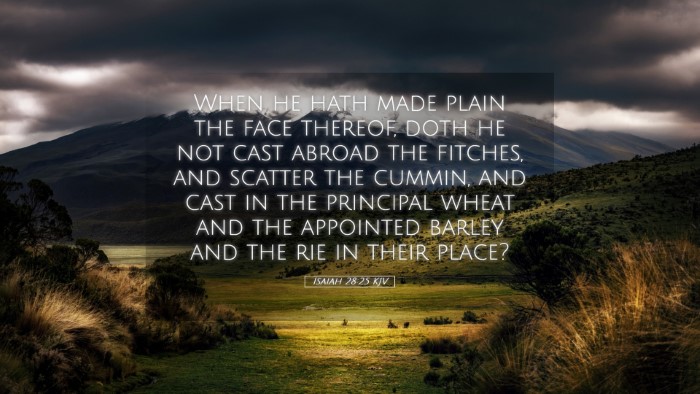Commentary on Isaiah 28:25
The verse Isaiah 28:25 states: "When he hath made plain the face thereof, doth he not cast abroad the seed, and the sower shall sow it?" This passage, rich in agricultural imagery, serves as an analogy for spiritual truths, urging readers to consider the principles of diligence and divine providence in the process of growth—both in the fields of nature and in the realm of faith.
Contextual Overview
Isaiah, known as the prophet of judgment and hope, addresses the people of Israel regarding their spiritual state and their relationship with God. This particular chapter highlights the theme of God's justice and the consequences of rejecting His guidance. The agricultural metaphors used throughout the text serve to illustrate deeper moral and spiritual lessons that resonate throughout the ages.
Insights from Commentators
-
Matthew Henry:
Henry emphasizes the necessity of preparation in the life of a believer. Just as a farmer must prepare the ground before sowing seeds, so must individuals prepare their hearts to receive the Word. In his commentary, he suggests that the act of making the ground "plain" symbolizes God's work in the hearts of His people—a clarifying and humbling process that allows for fruitful sowing of the Gospel message.
-
Albert Barnes:
Barnes draws attention to the principle of divine order and method in the way God interacts with humanity. He indicates that the sowing process symbolizes the spread of God's Word, suggesting that it is an intentional act designed to lead believers toward growth. Barnes articulates that just as the sower expects a harvest from the seeds sown, God expects a return on the seeds of faith planted in the lives of believers.
-
Adam Clarke:
Clarke focuses on the theme of God's sovereignty and human responsibility. He states that while God cultivates and prepares the field, it is the responsibility of the sower—representing spiritual leaders and every believer—to sow the seeds of truth diligently. Clarke elaborates on the idea that sowing is a collaborative process where human efforts coincide with divine preparation, echoing the broader theological notion of synergism in sanctification.
Theological Implications
This verse encourages reflection on the cultivation of one’s spiritual life. The imagery of sowing is significant as it represents the spread of divine truths; the seed can be understood as the Word of God or the Gospel. The implication is clear: believers are called to actively engage in the sowing process—sharing their faith and living out the principles of the Kingdom of God diligently.
1. Preparation is Key
The notion of preparing the ground is paramount in spiritual growth. Preparation might involve prayers, study of God’s Word, and a willingness to embrace discipline for spiritual maturity. Henry's commentary highlights that God prepares the heart of individuals, which must then be coupled with human initiative to pursue God actively.
2. The Assurance of Growth
The imagery of seed sowing carries with it an assurance of growth. As believers sow in faith, they can trust that God will bring forth fruit in due season. This principle of harvest is reiterated throughout Scripture and plays a crucial role in encouraging discipleship and evangelism, highlighting the necessity of patience and perseverance in faith.
3. Collaborative Nature of Ministry
Clarke’s insights emphasize the partnership between divine grace and human effort. This dialogue between God and humanity is essential in comprehending the nature of ministry. The act of sowing is not merely an individual task; it is a communal responsibility within the body of Christ, where each member has a role in promoting the Kingdom of God.
Practical Applications
For pastors, students, and theologians, the verse serves as a reminder of the importance of groundwork in both personal spirituality and corporate witness. How are we preparing the "ground" of our communities to receive the seed? What steps are we taking to sow diligently?
-
Encourage Prayer:
Foster a culture of prayer where believers are seeking God’s guidance in their ministry. This aligns with the preparation process necessary for healthy spiritual growth.
-
Invest in Teaching:
Provide solid biblical teaching that equips believers to understand the importance of sowing seeds of faith in their everyday interactions.
-
Promote Outreach:
Encourage outreach initiatives that reflect the act of sowing the Gospel into the lives of others—perhaps through community service, evangelistic efforts, or personal testimonies.
Conclusion
Isaiah 28:25 presents profound truths regarding the collaborative process of spiritual cultivation. By understanding the importance of preparation, the assurance of growth, and the collaborative nature of ministry, believers can be more effective in their task of reflecting God’s glory and extending His grace to the world. Such insights underscore the timeless relevance of Scripture and its application for contemporary faith communities.


